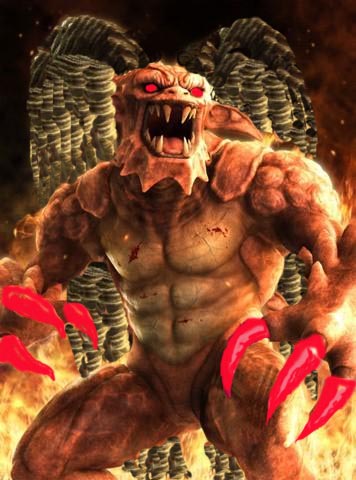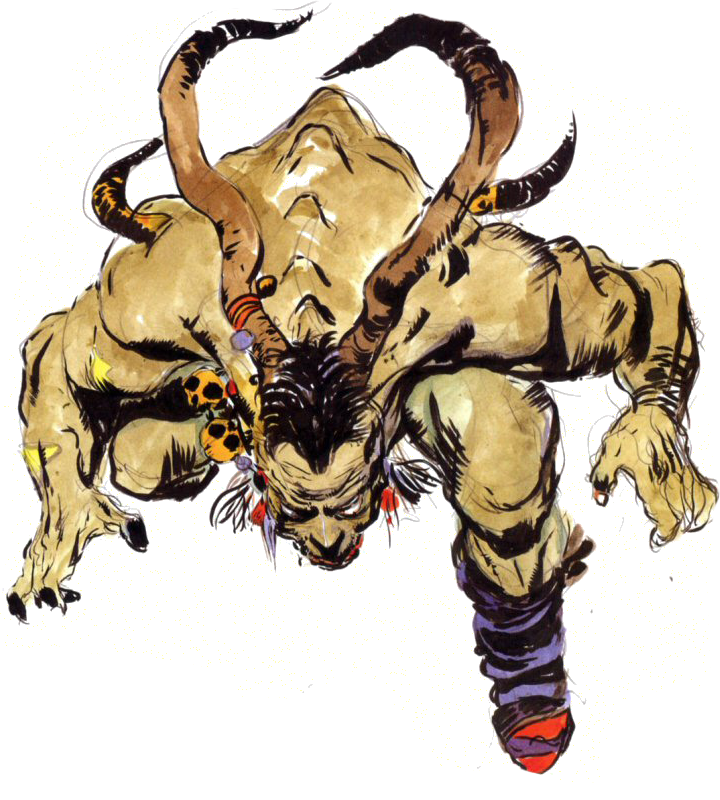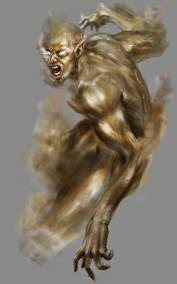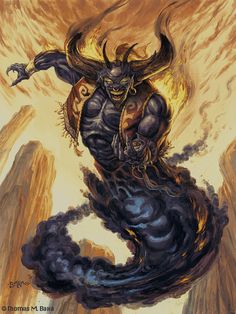 |

Afreet. Second Rank Demon . |
AfreetSig and Grampa Thor begin Book #3 Dragon Sword by battling an Afreet that is ruling a church congregation in Kansas. Afreet - also spelled ifrit, efreet, ifreet, and afrit - are supernatural creatures in Arabic and Islamic cultures. They are in a class of infernal djinn, spirits below the level of angels, noted for their strength and cunning.  Traits Traits
Afreets are said to live in a society structured along ancient Arab tribal lines, complete with kings, tribes, and clans. Afreets generally marry one another, but they can also marry humans. As with the jinn, an afreet may be either a believer or an unbeliever, good or evil, but he is most often depicted as a wicked and ruthless being. Etymology The
term Afreet ( Makhan embraced by an afreet. Illustration to Nezami's poem Hamsa. Bukhara, 1648. Afreet is mentioned in the Qur'an, Sura An-Naml (27:39-40) An Afreet (strong one) from the jinn said: "I will bring it to you before you rise from your place. And verily, I am indeed strong, and trustworthy for such work. One with whom was knowledge of the Scripture said: "I will bring it to you within the twinkling of an eye!" Then when Solomon saw it placed before him, he said: "This is by the Grace of my Lord - to test me whether I am grateful or ungrateful! And whoever is grateful, truly, his gratitude is for (the good of) his ownself; and whoever is ungrateful, (he is ungrateful only for the loss of his ownself). Certainly my Lord is Rich (Free of all needs), Bountiful. Afreet's
mention in the Qur'an and the Hadith, the eyewitness narratives of
Muhammad's words and actions, is always in the phrase "the afreet of
the jinn". Afreet has come to refer to an entire class of formidable,
rebellious beings, but in the confused world of underworld spirits. Afreet in Arabic literature In One Thousand and One Nights, in a tale called "The Porter and the Young Girls", there is a narrative about a prince who is attacked by pirates and takes refuge with a woodcutter. The prince finds an underground chamber in the forest leading to a beautiful woman who has been kidnapped by an afreet. The prince sleeps with the woman and both are attacked by the jealous afreet, who changes the prince into an ape. Later a princess restores the prince and fights a pitched battle with the afreet, who changes shape into various animals, fruit, and fire until being reduced to cinders. Afreet in contemporary literature In David Edding's book Domes of Fire, book one of the Tamuli, afreets are briefly mentioned as being evil beings, summoned to cause havoc. The term afreet is used to describe the small animal familiars who seek out humans with magical powers in John Levitt's "Dog Days" and "New Tricks." In the series, afreets are creatures that take the shape of small animals and protect their human counterparts. No one understands where they come from or where they go when they leave. In Neil Gaiman's novel American Gods, there is a downtrodden afreet that drives a cab in New York City. Another appears in "The Graveyard Book" as a member of the supernatural Honour Guard. In Walt Disney's Aladdin, afreets were spirits associated with elements. At least two afreets were mentioned in the TV series, the rock afreet that could petrify any being by the spray of its toxin (it was a small dinosaur/gargoyle-like animal with claws and bat-like wings) and the ice afreet, who was a humanoid, could talk, yet was very naive, although he could create ice, he could not turn living beings to ice like the rock afreet. Afreets have also been used in several manga such as Mahou No Iroha and Bastard!! as great infernal beings who are either summoned or who reside within magical objects such as swords. In Magic: The Gathering, Efreet is a creature type that tends to be red, chaotic creatures. |
|
| Web Design by Mike Lance | |
 )
comes from the Arabic term "
)
comes from the Arabic term " " (`afrt)
meaning evil in Islamic scripture
" (`afrt)
meaning evil in Islamic scripture
 In Jonathan Stroud's Bartimaeus Trilogy, afrits
are spirits of the 4th level: more powerful than djinn but less
powerful than marids (the most powerful spirits commonly summoned).
In Jonathan Stroud's Bartimaeus Trilogy, afrits
are spirits of the 4th level: more powerful than djinn but less
powerful than marids (the most powerful spirits commonly summoned).